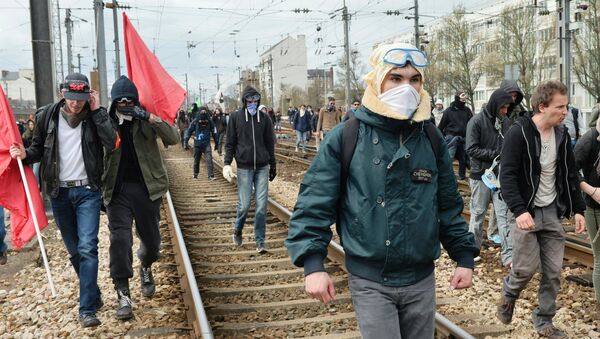Over a million people took part in protests last week over the labor reforms that many claim will allow employers to sack people more easily. French President Francois Hollande is under fire for pressing for reforms to the highly codified French labor laws — known as the Code du Travail — in order to give employers more flexibility.
The labor reforms were largely directed at making companies take on more workers on permanent contracts, rather than temporary ones, to bring down the unemployment rate from ten percent. The proposals would give employers more scope to lay-off workers and cut costs and allow some employees to work far longer than the current 35-hour week.
#France: Protesters in #Rennes block train tracks during action against labor law reform. #LoiTravail #Manif5Avril pic.twitter.com/C2GfeWqALw
— ѕyndιcalιѕт (@syndicalisms) April 5, 2016
It was following the 1968 riots that the Code du Travail was changed to bring the maximum working week was reduced to 44 hours. It has since been reduced, over time, to 35, which the unions want to maintain, but which Hollande believes is holding back productivity because of the lack of flexibility it leaves employers.
#France: Hundreds in #Toulouse now mobilizing for demonstration against labor law reform. #LoiTravail #Manif5Avril pic.twitter.com/aAYhL6cGqO
— ѕyndιcalιѕт (@syndicalisms) April 5, 2016
However, the student protests — over several weeks — have been particularly strongly backed — despite none of them being in a job and many facing unemployment the moment they leave college or university.
Student Protests
French students have a long history of political protests — going back as far as the Paris riots of 1968, when students held sit-ins in universities and clashed violently with police for several weeks over capitalism, consumerism and traditional institutions, values and order.
#Paris riots, 1968 pic.twitter.com/q2kN9nCEtc
— Matthew Hyndes (@MatthewHyndes) February 15, 2016
Watching the riots, Paris, France, 1968, photograph by Henri Cartier-Bresson. / 1960s, https://t.co/vn3rb9jJtT pic.twitter.com/K7p7e1xKiv
— Old Pics Archive (@oldpicsarchive) March 27, 2016
In 2006 — over a three-month period — French students demonstrated against the proposed controversial Equal Opportunity Law, which would have created a new job contract, known as the CPE, under which it would have been easier, during a contract's first two years, for workers under twenty-six years old to be fired.
Schools, universities, roads, railways and motorways were all blocked by students. There were violent clashes with riot police which turned sites such as the Sorbonne University into warzones, with police using tear gas. The government eventually backed down. President Jacques Chirac became a lame-duck president, and the career of his prime minister, Dominique de Villepin, never recovered.
This time round the students are once again using their political muscle to demonstrate against the introduction of labor reforms that cold see them more easily fired on a last-in-first-out basis in a downturn. Once again, they hope to weaken — if not topple — the government of the day.


